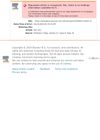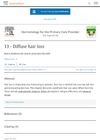Efficacy and Adverse Effects of Oral Janus Kinase Inhibitor Use in Patients With Lichen Planopilaris: A Retrospective Case Series and Systematic Review
November 2023
in “
The journal of investigative dermatology/Journal of investigative dermatology
”

TLDR Oral Janus kinase inhibitors may be an effective treatment option for lichen planopilaris with some risk of increased cholesterol and liver enzyme levels.
The study evaluated the efficacy and safety of oral Janus kinase inhibitors (JAKi) in treating lichen planopilaris (LPP), including its variant frontal fibrosing alopecia (FFA). A retrospective chart review of patients treated with oral JAKi at a specialty clinic and a systematic review of literature yielded data on 36 patients with an average age of 48.4 years. After an average treatment duration of 5.0 months, 80.6% of patients showed improvement, while 19.4% had persistent or worsened disease. There was a significant reduction in LPP Activity Index (LPPAI) scores from 5.69 to 3.27 (p<0.001) post-treatment. Adverse effects included increased cholesterol and/or triglyceride levels (8.3%) and transaminitis (2.8%). The study concludes that oral JAKi could be a potential treatment option for LPP patients who do not respond to conventional treatments.






